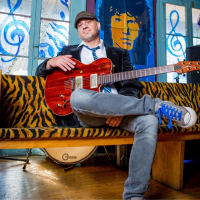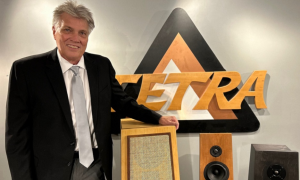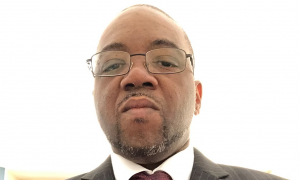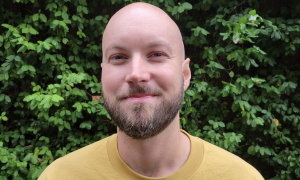Home » Jazz Articles » Chats with Cats » The Manager: Vernon Hammond of The Management Ark
The Manager: Vernon Hammond of The Management Ark

You want to do everything that you can to build your brand and to expose that brand.
—Vernon Hammond
About Vernon Hammond
A graduate of Lehigh and Rutgers Universities, Vernon studied sociology and marketing and as well becoming a Certified Financial Planner. In 1982 he co-founded the Management Ark whose roster has included some of the biggest names in Jazz (Wynton Marsalis, Stanley Jordan, Kenny Garrett, Joey Alexander, etc.). He is currently based in the Princeton New Jersey area.All About Jazz: Did you always want to get into music management?
Vernon Hammond: I didn't even know there was such a thing. I never even thought about it. Do you know the story how we got into this business, my partner and I? So here's what's happening. I'm at home one day and my girlfriend at the time, who's my wife now, comes home and she says, "on the way home I stopped at this record store and a friend of ours happened to be there. And he gives me a record and says, here, give this record to Vernon, he'll like it."
So I look in the bag and don't recognize the artist. I put it aside figuring I'll check it out later. Well an hour later my best friend, who is my business partner, gives me a call—he's really excited. He's out in California and he recently graduated from Harvard Business School. He's out there working on a turnaround project for a company. He went out to hear some music and he calls me, he's really excited. He said, "man, I just heard this guy playing the horn and he's really really good. I went backstage and talked to him and we started talking and he's telling me how he was having some difficulty with his business and wanted to know whether I can help him out. I had spoken to him about recently getting my MBA at Harvard." So Ed [Arrendell II] says, "you know, this guy can really play." I said, "yeah what's his name?" He says, "Wynton Marsalis." Well this is 1981 right? And at the time, I mean, Wynton was brand new, I think he was 18 years old. I said, "wait a minute," because I hadn't heard of Wynton at all. Although I'd listened to his music, I hadn't heard of him. So I go over and get the bag that my wife had just given me like an hour before and it's Wynton's first record. So Ed says, "why don't we get together and manage his career?" I said, "you won't believe this man, I just got his first record."
So, two weeks later I'm on a plane going to Europe with Wynton. Wynton's career takes off and as a result of that a lot of other people were interested in joining our roster. That was 1981 and it's 2020 now [laughs].
AAJ: So you had no experience in the music business at that point?
VH: Well, I had a degree in marketing and also a CFP. Ed has an MBA from Harvard, ya know, so I thought we can figure it out; getting from point A to point B. Just doing the things that were required to do that.
AAJ: What's a typical work day for you like?
VH: Well it depends on what day [laughs]. Mondays are usually the days when I usually, kind of, just look at the big picture. You know, what's on my table, what's going on. And I review all the artist schedules and what's going on. And then I put the things that are most important first. I look at those days mostly as triage days. I put the things that are most important up front and deal with that. It's the opportunities to do live performances. But there's a lot that goes into obtaining those opportunities and most of it is about building and reinforcing your brand and that varies with the artist. If they're well known in the market then the talent buyers are going to be comfortable in thinking that they can put people in the seats. So they're more likely to say, yes, we want to book them and come play my venue. You would like to think it's about how talented a musician is and how great their art is, it's not just about that. I mean these folks who are talent buyers, they're business people and they've got to keep their doors open which means they've got expenses they've got to cover. Which means that the artist that they bring in has to attract a certain number of people in order to cover the expenses and the fees that we're asking for.
AAJ: What qualities do you look for when you're considering taking on an artist?
VH: Well, a lot of it comes down to, and I'm not a musician, but I've listened to music for quite a long time and have been fortunate enough to work with some really talented musicians. So it comes down to what I hear, whether I think they have a lot of talent and also depends on the musicians I work with and what they think. Also it's whether or not there's chemistry between me and the musician, the artist, because we have to work together and spend a lot of time working with them. So that's important. And I'm doing something very similar to what anybody else in the business is doing. Just like I talked about, the talent buyers want to know how many people can this person put in the seats. Well I'm wondering how difficult is it going to be for me to sell the talent buyers on bringing these guys in to do performances.
AAJ: Do you think every artist should have a manager?
VH: Umm, it depends. In the beginning when the artist is not really that busy, if they have good business skills they can do it by themselves. But at some point I would think that most artists probably need somebody to help them with their business.
AAJ: You've worked with some of the biggest names in jazz. Are there any artists you still want to work with or regret not having worked with?
VH: Hmm. Well, I won't name names but certainly there are a lot of folks out there that I respect who are not on our roster. But yeah, I mean there are really talented musicians, who if I'm not working with them, I'd probably be interested as long as our personalities match.
AAJ: How is managing a jazz artist different than artists of another genre?
VH: I think marketing for the most part is marketing. You have a product. And you start with exposing that product to the market that you're trying to reach. And you want to do that and remind people about that product. And you want to continually do that because you want that person or that product to be in the minds of the people you're trying to influence. And then at some point you want to persuade them. You want them to buy a ticket to the show.
AAJ: So it's really the same regardless of genre is what you're saying?
VH: Yea, ya know basic marketing is pretty much the same: expose; remind; persuade; move to positive action. So, you know, whether it's a bar soap, or a show, you want people to... it's like a better mousetrap. You can have something that's really great but if nobody knows about it, they're not going to get there, they're not gonna buy it. So if you've got a great artist you want people to know about it. You want people to come out and hear that, you want them to be exposed to it. So, yeah, marketing is pretty much the same regardless of what you're selling.
AAJ: Has your job changed much since you began in 1981 considering the music business has changed a lot?
VH: Actually the business has changed quite a bit. Back in the '80's, getting record labels on board, or getting deals for the artist, and getting record labels to help with the marketing and promotion, it was a lot easier than it is now. And I think some of that is about the fact that the labels had... there was a lot of trickle-down from some of the bigger acts on labels because when there was a lot of physical distribution, like WEA had a big physical distribution, as did Sony, they all had huge physical distribution outfits. It got to a point where digital distribution became king and they no longer controlled that, then I think it dried up a lot of the revenue. And some of that revenue in the past had been trickling down to the jazz artist so we got better deals for them at that time. And we got more human and financial resources from them in order to market and promote the artist. You don't see that as much now.
AAJ: So it's come down to doing it more on your own?
VH: Well, I mean, you do get some support if you're signed to a label. And some labels are better than others. Some have more human and financial resources than others. But, yeah, a lot of it does have to come from the management agency, people doing bookings, from the publicist, from the radio promotion people. So I think that in most cases, you're not getting the same level of support than we once had back in the day.
AAJ: Do you ever make suggestions on musical direction for an artist?
VH: I pretty much stay out of that. I may throw an idea out there but there's not one that I want to try and push. First of all because, again, I'm not a musician so the guys that I work with know infinitely more about music and about art than I do. I may throw something out there just to see what they think and every now and again someone might say, that's not a bad idea. But, in general, I don't like people to get in the way of what the artist wants to do. I don't have a problem with people making suggestions about what the artist can do, or what the artist might want to do. But, it's no more than a suggestion because you never know when you're going to get in the way of something truly great. You start pushing and pulling an artist in different directions away from his own vision, away from... because what the artist is creating is a manifestation of the human spirit, it's a manifestation of who he is. So when other people start getting in the way, and pushing and pulling in different directions I think they're really getting in the way of what the artist wants to do. We don't know, they may be getting in the way of something that's really great.
AAJ: Do you have advice to artists for starting out and building a career?
VH: Well not as far as the creative aspect is concerned. You want to do everything that you can to build your brand and to expose that brand and that starts with the music. That's first and foremost but then in addition to that, what do you want people to know about you? What's important for people to know about you? For instance, there's a British Nigerian singer songwriter I'm working with [Ola Onabule]. He's a vocalist and I really like his music. I like his voice but in addition, I really like the music that he writes and the songs that he writes. So it's important that people understand that he's an important songwriter and a lot of what he writes is pertinent to what's going on today. So what we've done with his brand is to first get people to hear his music, but in addition to that, communicate his brand: a British, Nigerian, socially-conscious, singer-songwriter. And that socially-conscious singer songwriter is an important part of that brand.
Tags
PREVIOUS / NEXT
Support All About Jazz
 All About Jazz has been a pillar of jazz since 1995, championing it as an art form and, more importantly, supporting the musicians who make it. Our enduring commitment has made "AAJ" one of the most culturally important websites of its kind, read by hundreds of thousands of fans, musicians and industry figures every month.
All About Jazz has been a pillar of jazz since 1995, championing it as an art form and, more importantly, supporting the musicians who make it. Our enduring commitment has made "AAJ" one of the most culturally important websites of its kind, read by hundreds of thousands of fans, musicians and industry figures every month.























